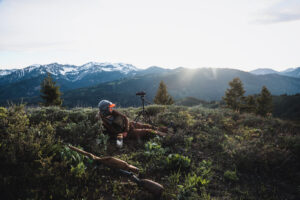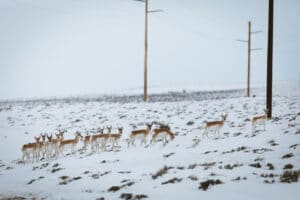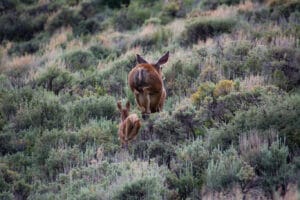This beloved country is large and encompasses Thompson Pass, Horse Creek, McDougal Gap, North and South Cottonwood Creeks, Wyoming Peak, and Piney Creek. Wildlife in the Wyoming Range include genetically pure Colorado River cutthroat trout, Snake River cutthroat trout, black and grizzly bears, elk, half of the state’s moose population, and the northern end of the longest mule deer migration corridor in the world.
WHY IS THE WYOMING RANGE SO SPECIAL?
The high grassy alpine basins, steep avalanche chutes, and dark lush forests that make up the Wyoming Range create incredible summer range ungulate habitat.
The mule deer that live here are sought after by deer enthusiasts across the U.S., who often line the roads of the Wyoming Range's winter range habitat in November and December with spotting scopes and long-lens cameras to view the world-class animals this part of the world produces. Additionally, thousands of nonresidents to Wyoming apply for the opportunity to pursue this trophy wildlife in this trophy landscape, many of them waiting nearly a decade before having the opportunity to hunt in the Wyoming Range. Unfortunately, because of severe losses to the population from harsh winters and habitat loss, wildlife officials project this mule deer herd is only 20% the size of its height in the early 90s.
In addition to the famed mule deer herd, the landscape draws elk hunters, wildlife watchers, backpackers, overland motorcycle riders, snowmobilers, fishermen, and other recreationalists from around the world. Unfortunately, changing conditions, including barriers in the form of fences, rural development, roadway crossings, and energy development, impact the long-term health of the herds and other wildlife.
The Migration Corridor
Rather than a single path, the Wyoming Range mule deer migration corridor is a highly braided set of routes that deer use to pass between the Hoback Rim above Bondurant south to Kemmerer. The corridor crosses two mountain ranges, the Salt River Range and the Wyoming Range with the longest treks being over 130 miles long.
The Wyoming Range has multiple threats with fences impeding movement across the landscape, housing developments on winter ranges, roadways cutting off migration and taking out animals, and some oil and gas development impairing habitat. The Federation tells the story of all of these groups working together to conserve the migration corridor in the film Stakeholders.
The Wyoming Game and Fish Department will follow the process created by the Governor’s Executive Order on Migration Corridors to address the needs of the corridor from a land management level.
Bridger-Teton National Forest Planning
The high country of the Wyoming Range is largely dominated by lands managed under the Bridger-Teton National Forest. The management plan for this national forest is due for revision in the near future, and the Wyoming Wildlife Federation team is working in the trenches to ensure the right balance of wildlife and recreation values are achieved in this revised plan.
The team is currently mapping high-priority areas within this massive landscape of the highest wildlife and recreational value to ensure recommendations during National Forest planning are what is best for future generations of our natural world and the people who enjoy it. This will continue to be a multi-year process with details emerging to engage local citizens and hunters to make a difference in this 20+ year public lands policy document.
Latest Related News
Diverse voices for the Bridger-Teton National Forest
Public lands belong to all of us, and their future depends on diverse voices coming together. At WWF, we work to unite people from across Wyoming-recreationists, conservationists, local communities, and industry leaders-to protect wildlife and the landscapes we love. The Bridger-Teton National Forest …
Diverse voices for the Bridger-Teton National Forest Read More »
Wyoming State Land Parcel 194: Why is it so Important?
Wyoming State Land Parcel 194: Why is it so important for wildlife?
Why “Fat Bottom Does” Make The Mule Deer World Go ‘Round
Fat mule deer equal healthier fawns, more survival, and bigger bucks. Find out how you can help ensure our does are healthy!
Access & Outdoor Opportunities
Wyoming holds some of the most pristine and intact ecosystems on the planet, with public lands comprising nearly half of…
WANT TO HELP FUND OUR WORK? MAKE A DONATION
The Issues Addressed
Each Program that Wyoming Wildlife Federation runs affects a variety of
different conservation Issues. Click on an Issue to find out more about it.
Help Protect Our Way of Life
We need everyone who values the wild spaces of Wyoming to get involved. Are you ready?




